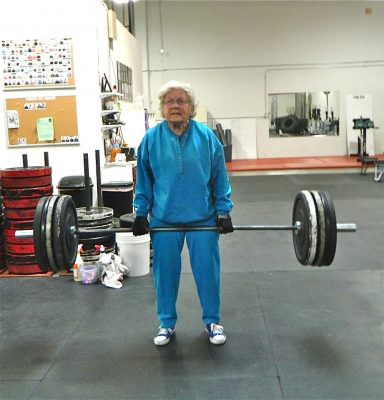
If your grandfather is a normal person, it is very likely that he has been to the doctor many times, that he is on medication, that he does not hear very well and that he does not have the same locomotion capacity and reasoning that he had some years ago.
Doctors say this is “normal” and typical of the advancing age. They also prescribe drugs based on the belief that this will improve the quality of life of these people. I do not say that this is not necessary in some cases, but I do not believe that this is the best approach to increase health span. Although they “breathe” I think that they deserve better and more.
More than two years ago, a piece in a portuguese newspaper stated that the Portuguese lived longer and longer but less healthy. The piece also mentioned: “Portuguese women have one of the longest life expectancy in the world, but, paradoxically, enjoy far fewer healthy years than women from the best-ranked countries in Europe.”
When reading the piece, the first thing I thought was: we have to be really stupid, because even with the daily advances of medicine and scientific knowledge, we have not yet been able to understand what are the causes behind this SICK LONGEVITY. The problem is not the advancing years, the problem lies in nutrition and exercise related advice we hear every day (especially in hospitals), which is simply erroneous. If prevention campaigns and the information leaflets in hospitals were really supported by scientific evidence, one would not witness so many people suffering from chronic pain, diabetes, heart disease, osteoporosis, sarcopenia, autoimmune diseases and cancer.
Everyone recognizes that physical exercise is key to optimal body function (our brain and body did not develop while sitting on our asses), and that, unlike drugs, has a positive and self-regulating impact on the various systems of the human body.
Exercising is more effective on improving your health than any patented medicine.
“But I walk an hour every day”
Let me tell you one thing, walking is the least you can do to keep your body working. If you tell me that is either walking or lying back on the couch eating ice cream, then you better walk. But if you tell me that you want to live a healthy life until you die, maintain your autonomy, decrease the risk of falls, increase self-confidence, sleep better, recover faster from an injury and not be part of the statistics we saw above, then I recommend you start seriously thinking about lifting weights and engaging in strength training. Walking will not give you, even by shadows, the same benefits as strength training.
Another thing, if you are one of those people with cardiovascular disease, your doctor (or some Dr. from Google) has probably told you that walking is important to improve your cardiovascular health. The problem is that walking will not help you much. The lack of aerobic capacity is not a risk factor for heart disease, a sedentary lifestyle is! This means that you may have a huge aerobic capacity and a heart disease at the same time. In fact, according to this study published in the 2006 American Heart Association Journal (LINK), to this one published in 2008 in the European Heart Journal (LINK) and to this one published in the Mayo Clinic Proceedings (LINK) in 2012, marathoners are those who appear to be at increased risk of developing cardiovascular disease.
Furthermore, according to the cardiologist Henry A. Solomon in the book “The Exercise Myth”, cardiovascular health refers to the absence of heart and blood vessel disease, and not to an individual’s ability to do a certain amount of physical work. According to Dr. Solomon, your cardiac health is determined by the condition of various structures of the heart, including the heart muscle, the valves, the special cardiac tissues that carry electrical impulses and the coronary arteries. So, do not expect exercise to “clean” what you practice in your daily diet.
The cardio craze came about in the late 60’s / early 70’s through Dr. Kenneth Cooper, the person who designed the Cooper test for US military use. It was roughly from this moment on that VO2max (a measure of aerobic capacity) was “elected” the holy grail of physical fitness. Although relevant for performance and longevity, VO2max is not the only marker of physical fitness. Strength in its various forms has been more strongly correlated with increased longevity than VO2max. While strength training can increase both functional strength and aerobic capacity, the typical cardio training will not make you stronger and will only slightly “at best” increase your VO2max.
Why Strength Training?
Because you tend to lose strength and power as you age, and because several studies have shown that loss of strength and muscle mass are associated with increased mortality (LINK, LINK, LINK). Fortunately, lifting weights is the best stimulus to counteract this trend and to increase our functional capacity. Under normal conditions, strength peaks between the ages of 20 and 30, remaining relatively stable or decreasing slightly over the following 20 years. But this is dependent, of course, of what one does in training.
It is in the sixth decade of life that decreases in strength are quite pronounced. According to several longitudinal studies, declines in muscle strength are around 15% between 60-70 years of age and 30% after age 70. Most reasons relate to the loss of muscle mass, pronounced loss of fast-twitch muscle fibers, decreased endocrine function, loss of tissue mobility / elasticity and cell dehydration. All of these can be minimized by following a proper strength training program.
Yes, it is possible to start strength training at any age, I know people who started training at 50, 60 and over 80, it’s all a matter of mindset and willpower. Also, you need to train according to your needs as opposed to the convenience of most gyms (i.e. spending hours on the treadmill / elliptical / bike, going through all the machines and ignore training with free weights) where supervision, tutoring and skill learning are dismissed.
Does this mean that I should get my grandparents to lift Olympic bars and weights without any criteria? Of course not, that would not be very smart. To get the most benefit of lifting weights you have to walk a path and create a solid movement base. You have to be screened and assessed for movement quality and physical parameters. Preferably guided by a fitness professional or personal trainer knowledgeable in movement and strength training science.
Listen, your doctor’s opinion might be highly valuable, however remember the following: 1) your doctor is not a specialist in movement (which is ok, they can not be trained in everything); 2) your doctor has no experience training people (which is also ok, it’s not their job); 3) your doctor probably does not even know how to lift weights or to move well (this is obviously not ok!). In other words, just as you would not ask advice on surgery techniques from strength coaches, you should also not ask advice on training methodologies and forms of physical exercise from surgeons.
Oh, and before you tell me that I’m being fundamentalist and suggesting that you should not train other physical abilities (such as stability, mobility, endurance, speed, agility, motor coordination, power), allow me to conclude with the following observation: ideally, the training program of any human being on the planet should always be the one that induces the adaptations necessary to fulfill his /her personal goals.
The key word here is adaptation! The more adapted you are the better prepared you will be to face any situation. Adults are free to do whatever they want in life. Everyday we make decisions and choices and those decisions matter. My goal is to increase longevity and live until the last days of my life feeling great and strong.
What’s yours?
See you soon!
Pedro Correia
References
Möhlenkamp S, Lehmann N, Breuckmann F, Bröcker-Preuss M, Nassenstein K, Halle M, Budde T, Mann K, Barkhausen J, Heusch G, Jöckel KH, Erbel R; Marathon Study Investigators; Heinz Nixdorf Recall Study Investigators. Running: the risk of coronary events : Prevalence and prognostic relevance of coronary atherosclerosis in marathon runners. Eur Heart J. 2008 Aug;29(15):1903-10. doi: 10.1093/eurheartj/ehn163. Epub 2008 Apr 21.
Neilan TG1, Januzzi JL, Lee-Lewandrowski E, Ton-Nu TT, Yoerger DM, Jassal DS, Lewandrowski KB, Siegel AJ, Marshall JE, Douglas PS, Lawlor D, Picard MH, Wood MJ. Myocardial injury and ventricular dysfunction related to training levels among nonelite participants in the Boston marathon. Circulation. 2006 Nov 28;114(22): 2325-33. Epub 2006 Nov 13.
O’Keefe JH, Patil HR, Lavie CJ, Magalski A, Vogel RA, McCullough PA. Potential adverse cardiovascular effects from excessive endurance exercise. Mayo Clin Proc. 2012 Jun;87(6):587-95. doi: 10.1016/j.mayocp.2012.04.005.
Rantanen T, Harris T, Leveille SG, Visser M, Foley D, Masaki K, Guralnik JM. Muscle strength and body mass index as long-term predictors of mortality in initially healthy men. J Gerontol A Biol Sci Med Sci. 2000 Mar;55(3):M168-73.
Ruiz JR, Sui X, Lobelo F, Morrow JR Jr, Jackson AW, Sjöström M, Blair SN. Association between muscular strength and mortality in men: prospective cohort study. BMJ. 2008 Jul 1;337:a439. doi: 10.1136/bmj.a439.
Takata Y, Ansai T, Soh I, Akifusa S, Sonoki K, Fujisawa K, Awano S, Kagiyama S, Hamasaki T, Nakamichi I, Yoshida A, Takehara T. Association between body mass index and mortality in an 80-year-old population. J Am Geriatr Soc. 2007 Jun;55(6):913-7.
Zatsiorsky V., Kraemer, W. Science and Practice of Strength Training 2nd Edition.
Human Kinetics (2006).
